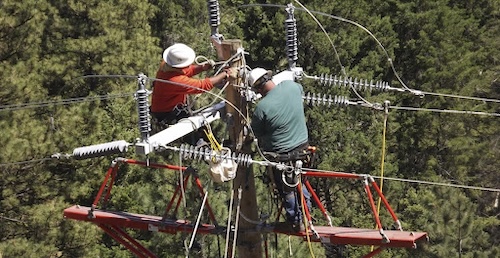The Power of Skilled Trades: Electrical Lineworkers are Crucial for a Resilient Future

17 Apr 2025
News
Whether maintaining critical infrastructure like power lines, roads and water systems or working as a mechanic, welder or HVAC technician, skilled trades are the backbone of a functioning society. The demand for qualified personnel in these roles has skyrocketed with the rising technological demands of daily life. At the same time, a significant shortage of skilled workers across many essential trades threatens the ability to meet that demand.
Oregon Trail Electric Cooperative (OTEC) acknowledges one specific occupation fitting squarely into this narrative: electrical lineworkers. These skilled professionals’ contributions to OTEC and the communities it serves are invaluable. Furthermore, OTEC recognizes that significant investment in this trade is necessary to ensure the ability to fulfill the region’s requirements.
Now is the time to acknowledge and honor the skilled workers who provide this essential service, as April 18th is National Lineman Appreciation Day. Linemen perform vital roles in ensuring that electricity is safely delivered to homes and businesses to sustain and support the evolving infrastructure of our society.

Supply to meet the demand
Recent estimates indicate nearly 11,000 lineworker openings annually through 2033, with a surge in electrical consumption driven by the growing complexity of technology and infrastructure development. This demand is heightened by the fact that the general lineworker workforce is aging, with many individuals approaching retirement age. At the same time, technical schools throughout the country are experiencing a severe decline in enrollment.
The requirements asked of electrical lineworkers involve extensive training, experience, and precision in maintaining the power grids that fuel our modern lives. In an ongoing commitment to community, youth, and education and to address the labor shortage, OTEC offers scholarships to its members to address the labor shortage. The Lineman School Scholarship provides $5,000 to train the next generation of linemen, while the Trade School Scholarship delivers the same amount for those interested in attending a trade, vocational or technical school.
These programs are vital in bridging the gap between the growing demand for skilled workers and the insufficient supply of qualified individuals. By encouraging young people to enter the trades through scholarships and training opportunities, these initiatives ensure that essential services continue to be delivered and communities remain resilient in the face of evolving technological and environmental challenges.

Promising careers
As the demand for skilled workers increases, so do salaries. In industries like electrical work, the value of skilled labor has become more evident. Linemen, in particular, are compensated well for their expertise and commitment to safety, with salaries rising to reflect their increasing importance in society. The most recent designation by the U.S. Bureau of Labor Statistics indicated a median annual wage of $85,420. This trend is a testament to the skill and risk involved in the profession and the growing recognition of the labor force's importance in ensuring a stable economy and safe communities.
National Lineman Appreciation Day helps remind us of the value these workers bring to our communities and the need to invest in the future of skilled labor. It's crucial to reflect on the broader value of skilled labor and the increasing need for tradespeople. By recognizing their contributions and supporting the education of new workers, we can ensure that essential services continue uninterrupted for generations to come.
To learn more about the tremendous value electrical lineworkers play in the OTEC service area, visit Oregon Trail Electrical Cooperative or our Economic Development Page. Together, we can create a skilled workforce to help build a resilient energy future for our Oregon Trail communities.
More Topics

Shaping the Future of Rural Energy: The Impact of National Energy Policies on Local Power Supply
Mar 25 2025



